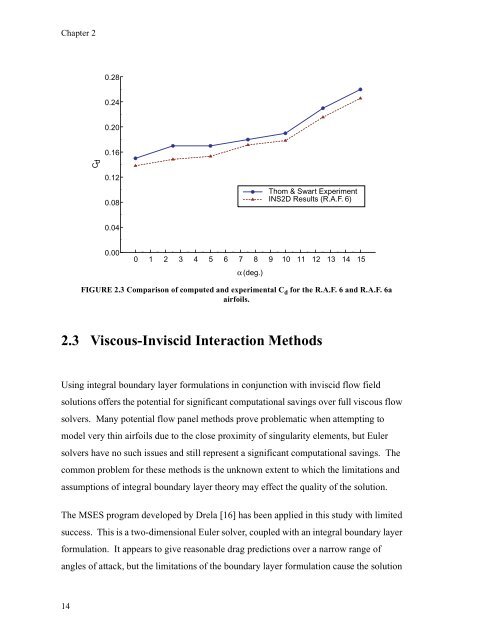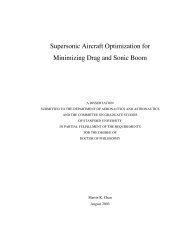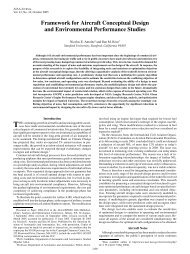- Page 1 and 2: AERODYNAMICS AND DESIGN FOR ULTRA-L
- Page 3: I certify that I have read this dis
- Page 7 and 8: Abstract Growing interest in micro-
- Page 9 and 10: Nomenclature A Rotor disk area B Nu
- Page 11 and 12: τ Shear stress ω, Ω Rotor angul
- Page 13 and 14: Contents Acknowledgments...........
- Page 15 and 16: Chapter 5..........................
- Page 17 and 18: List of Tables 3.1 Effect of Airfoi
- Page 19 and 20: List of Figures 2.1 Comparison of I
- Page 21 and 22: 5.6 Small test fixture in the large
- Page 23 and 24: 6.38 Predicted spanwise thrust dist
- Page 25 and 26: Chapter 1 Introduction 1.1 Looking
- Page 27 and 28: Chapter 1 wind-tunnel facilities an
- Page 29 and 30: 1.3 Summary of Contributions Chapte
- Page 31 and 32: Chapter 2 Two-Dimensional Computati
- Page 33 and 34: Chapter 2 The artificial compressib
- Page 35 and 36: Chapter 2 The control volume method
- Page 37: 2.2.4 Comparison with Experiment Th
- Page 41 and 42: 2.4 Flow Field Assumptions The INS2
- Page 43 and 44: Chapter 2 The results of these time
- Page 45 and 46: Chapter 3 Analysis and Design of Ai
- Page 47 and 48: Chapter 3 adverse gradient in the p
- Page 49 and 50: The canonical pressure coefficient
- Page 51 and 52: Chapter 3 reaches α=5.0 and a lift
- Page 53 and 54: ����� ����� �
- Page 55 and 56: Cl 0.50 0.40 0.30 0.20 0.10 0.00 -0
- Page 57 and 58: Re=6000 result due to Reynolds numb
- Page 59 and 60: FIGURE 3.10 NACA 0002 and NACA 0008
- Page 61 and 62: C l C l 0.8 0.7 0.6 0.5 0.4 0.3 0.2
- Page 63 and 64: Chapter 3 The maximum L/D for all n
- Page 65 and 66: 3.5 Effect of Leading Edge Shape an
- Page 67 and 68: C l 0.60 0.50 0.40 0.30 0.20 0.10 0
- Page 69 and 70: Chapter 3 prominent droop near the
- Page 71 and 72: Chapter 3 Small improvements in lif
- Page 73 and 74: Chapter 4 Hybrid Method for Rotor D
- Page 75 and 76: Q/r D L Chapter 4 FIGURE 4.1 Typica
- Page 77 and 78: 4.2.3 Elimination of Trigonometric
- Page 79 and 80: Chapter 4 applications of interest
- Page 81 and 82: 4.2.7 The Distinction Between the A
- Page 83 and 84: Chapter 4 Two input parameters dete
- Page 85 and 86: Chapter 4 simplification, particula
- Page 87 and 88: 4.3.3 Conservation of Angular Momen
- Page 89 and 90:
Chapter 4 moves downstream is less
- Page 91 and 92:
Chapter 4 of the pitch angle at the
- Page 93 and 94:
FIGURE 4.6 Converged wake streamlin
- Page 95 and 96:
Chapter 4 idealized models. The met
- Page 97 and 98:
����� ������
- Page 99 and 100:
Chapter 5 Overview of Experimental
- Page 101 and 102:
1. Substrate Preparation 2. Polymer
- Page 103 and 104:
Chapter 5 surface finish and aids i
- Page 105 and 106:
FIGURE 5.5 Small test fixture in th
- Page 107 and 108:
Chapter 5 The direct influence of t
- Page 109 and 110:
FIGURE 5.9 Large test fixture in th
- Page 111 and 112:
5.4.1 Motor Power Supply All tests
- Page 113 and 114:
Chapter 5 or roughly (+/-) 25% of t
- Page 115 and 116:
Chapter 5 newly forming blade tip v
- Page 117 and 118:
FIGURE 5.14 Near-body grid geometry
- Page 119 and 120:
Chapter 6 Design Examples and Compa
- Page 121 and 122:
Chapter 6 capable of speeds up to 1
- Page 123 and 124:
FIGURE 6.2 The Astro Flight Firefly
- Page 125 and 126:
t/c 0.5 0.4 0.3 0.2 0.1 0.0 FIGURE
- Page 127 and 128:
c/R 0.0 0.2 0.4 0.6 0.8 1.0 r/R Cha
- Page 129 and 130:
FIGURE 6.10 Carbon-fiber two-blade
- Page 131 and 132:
Power Req. (W) 3.5 3.0 2.5 2.0 1.5
- Page 133 and 134:
Chapter 6 TABLE 6.1 Comparison of p
- Page 135 and 136:
Electro-mechanical Efficiency 0.20
- Page 137 and 138:
these variations and possible solut
- Page 139 and 140:
upper and lower surface corners of
- Page 141 and 142:
Chapter 6 The Sample-1 rotor exhibi
- Page 143 and 144:
The static deformations described i
- Page 145 and 146:
Q( r) This problem is solved as a l
- Page 147 and 148:
Structural Analyses Chapter 6 The m
- Page 149 and 150:
Aero-Structural Twist (deg.) 0.00 -
- Page 151 and 152:
Thrust (g) 5 4 3 2 1 0 10000 20000
- Page 153 and 154:
Thrust (g) 4.5 4.0 3.5 3.0 2.5 2.0
- Page 155 and 156:
Torque per unit span (g cm) 0.75 0.
- Page 157 and 158:
Thrust per unit span (g) 3.5 3.0 2.
- Page 159 and 160:
V total / ωr 1.0 0.9 0.8 Classical
- Page 161 and 162:
Torque per unit span (g cm) 0.75 0.
- Page 163 and 164:
Chapter 6 Recall that this rotor wa
- Page 165 and 166:
Incidence (deg.) 30 25 20 15 10 5 0
- Page 167 and 168:
Thrust (g) 9 8 7 6 5 4 3 2 38000 40
- Page 169 and 170:
x/R 0.4 0.2 0.0 -0.2 Chapter 6 FIGU
- Page 171 and 172:
Cl 0.64 0.62 0.60 0.58 0.0 0.2 0.4
- Page 173 and 174:
C f 0.125 0.100 0.075 0.050 0.025 0
- Page 175 and 176:
Chapter 7 Micro-Rotorcraft Prototyp
- Page 177 and 178:
This vehicle does not currently inc
- Page 179 and 180:
FIGURE 7.2 The 65g prototype electr
- Page 181 and 182:
7.4 The 150g Prototype Chapter 7 Th
- Page 183 and 184:
At hover, with a mass of 153g, the
- Page 185 and 186:
Using the 150g prototype as an exam
- Page 187 and 188:
Chapter 7 Basic rotor theory has be
- Page 189 and 190:
most of the blade. These values are
- Page 191 and 192:
Chapter 7 For large scale helicopte
- Page 193 and 194:
Chapter 8 Conclusions and Recommend
- Page 195 and 196:
the significant performance gains a
- Page 197 and 198:
Chapter 8 are also opportunities to
- Page 199 and 200:
Chapter 8 formation flight, and man
- Page 201 and 202:
References [1] Spedding, G.R., Liss
- Page 203 and 204:
[28] Lamb, Sir Horace, Hydrodynamic




